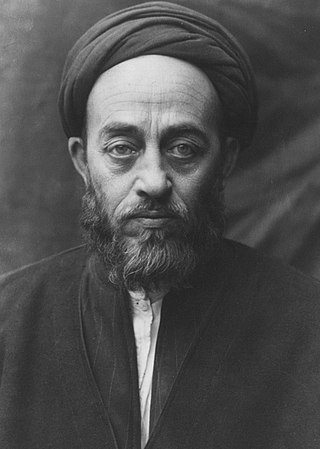
Muhammad Husayn Tabataba'i was an Iranian scholar, theorist, philosopher and one of the most prominent thinkers of modern Shia Islam. He is perhaps best known for his Tafsir al-Mizan, a twenty-seven-volume work of tafsir, which he produced between 1954 and 1972. He is commonly known as Allameh Tabataba'i and the Allameh Tabataba'i University in Tehran is named after him.

Ṣadr ad-Dīn Muḥammad Shīrāzī, more commonly known as Mullā Ṣadrā, was a Persian Twelver Shi'i Islamic mystic, philosopher, theologian, and ‘Ālim who led the Iranian cultural renaissance in the 17th century. According to Oliver Leaman, Mulla Sadra is arguably the single most important and influential philosopher in the Muslim world in the last four hundred years.
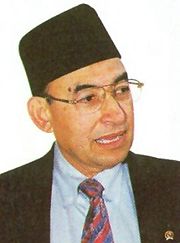
Alwi Abdurrahman Shihab is a scholar of the interaction of Christian and Muslim communities. Currently he is the Indonesian President's special envoy to the Middle East and the Organisation of Islamic Cooperation. He held the office of Indonesian Coordinating Minister for People's Welfare in 2004–2005 and the Foreign Minister of Indonesia from 1999 to 2001.

The Isfahan School is a school of Islamic philosophy. It was founded by Mir Damad and reached its fullest development in the work of Mulla Sadra. The name was coined by Seyyed Hossein Nasr and Henry Corbin.
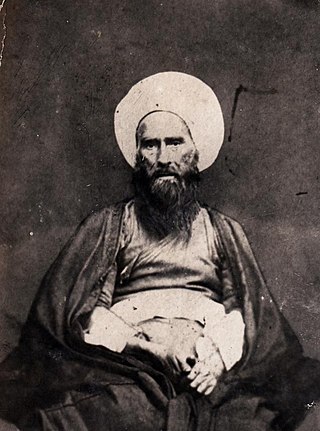
Hadi Sabzavari or Hajj Molla Hadi Sabzavari was an Iranian philosopher, mystic theologian and poet.
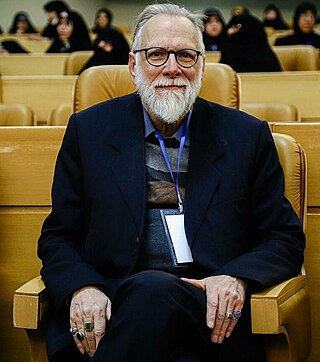
Gary Carl (Muhammad) Legenhausen is an American philosopher who teaches at the Imam Khomeini's Educational and Research Institute, which was directed by Mohammad-Taqi Mesbah-Yazdi.
Illuminationism, also known as Ishrāqiyyun or simply Ishrāqi is a philosophical and mystical school of thought introduced by Shahab al-Din Suhrawardi in the twelfth century, established with his Kitab Hikmat al-Ishraq, a fundamental text finished in 1186. Written with influence from Avicennism, Peripateticism, and Neoplatonism, the philosophy is nevertheless distinct as a novel and holistic addition to the history of Islamic philosophy.
Kasr al-asnam al-jahiliyyah fi dhamm al-mutasawwifin. The word "mutasawwifin" referred to here is not used according to its usual meaning of one who follows Sufism but means one who pretends to follow it. In this treatise, Mulla Sadra criticizes the excesses of those in his day who, pretending to be Sufis, disregarded the Shari'ah and its teachings.

Muhammad Quraish Shihab is an Indonesian Arab-Bugis Muslim scholar in the sciences of the Qur'an, an author, an Academic Scholar, and former Minister of Religious Affairs in the Fourth Development Cabinet (1998). He is the older brother of the former Coordinating Minister for People's Welfare, Alwi Shihab.
The Transcendent Philosophy of the Four Journeys of the Intellect, known as Four Journeys, is an extended compendium of Islamic philosophy written by the 17th century Islamic scholar, Mulla Sadra, In which he attempted to reach Sufism and prove the idea of Unity of Existence by offering a new intake and perspective on Peripatetic philosophy that was offered by Alpharabius and Avicenna in the Islamic world. The book explains his philosophy of transcendent theosophy. It was first published in print in 1865 in Tehran in four volumes, where it was accompanied by a commentary on three of the volumes by Hadi Sabzavari (1797–1893). To date, no notable, critical English translation of the book has been made.
Tafasir Al Quran are collections of books as commentaries on the Quran, written by Mulla Sadra.
Mahdi Fadaei Mehrabani is an Iranian writer and researcher in Islamic philosophy, mysticism and political philosophy. He is one of the winners of Farabi International Award, 2009 and the Winner of Iran’s Book of the Year Awards, 2016. Mehrabani has written several books and articles</ref> and currently is an assistant Professor at University of Tehran. Mehrabani used to be a researcher at State University of New York from 2017 to 2018.
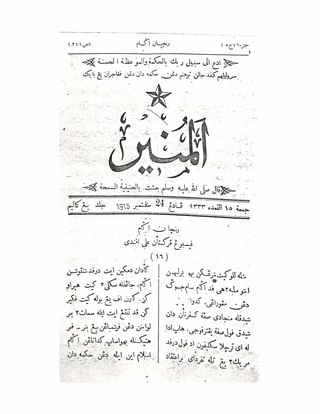
Al-Munir was an Islamic magazine, written in Arabic-Malay, published in Padang from 1911 until 1915. Inaugurated by the initiative of Abdullah Ahmad in early April 1911, Al-Munir was listed as the first Islamic mass media in Indonesia. The magazine was often associated with Al-Imam magazine published under the direction of Sheikh Tahir Jalaluddin in Singapore during 1906-1909. In addition to Abdullah Ahmad, several religious figures such as Abdul Karim Amrullah, Muhammad Thaib Umar and Sutan Muhammad Salim were recorded in the ranks of the editorial board.
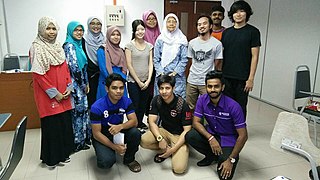
Zailan Moris is a Malaysian scholar of Islamic philosophy and former professor of the School of Humanities at the University Sains Malaysia. Her main interests are Islamic philosophy, comparative religion and Sufism.

Tafazzul Husain Khan Kashmiri (1727–1801), also known as Khan-e-Allama, was a Twelver Shia scholar, physicist, and philosopher. He produced an Arabic translation of Sir Isaac Newton's Principia.

Jam'iyyah Ahlith Thariqah al-Mu'tabarah an-Nahdliyyah or abbreviated as JATMAN is an Indonesian religious organization whose members focus on practicing the teachings of the tariqa.
Mohammed Rustom is Full Professor of Islamic studies and global philosophy at Carleton University in Ottawa, Canada and Director of the Carleton Centre for the Study of Islam. An internationally recognized scholar whose works have been translated into a dozen languages, his research interests include Arabic and Persian Sufi literature, Islamic philosophy, Qur’anic exegesis, translation theory, and cross-cultural philosophy.
Sajjad Hayder Rizvi is an intellectual historian and professor of Islamic intellectual history and Islamic studies at the University of Exeter.

Islamic Philosophy from its Origin to the Present: Philosophy in the Land of Prophecy is a book by Seyyed Hossein Nasr, Iranian philosopher and University Professor of Islamic studies at George Washington University. The book is a history and overview of Islamic philosophy covering its origins in the 9th century to the modern era.












